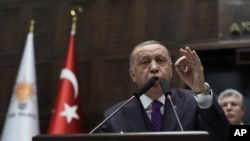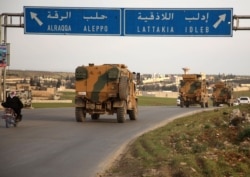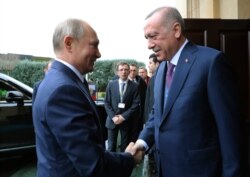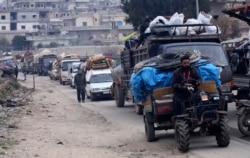Turkish President Recep Tayyip Erdogan has issued an ultimatum to Damascus warning of military action if the Syrian government does not withdraw its armed forces from Turkey's observation posts in Syria's Idlib province. Erdogan's threat is the latest ratcheting up of tensions following Monday's killing of Turkish soldiers by Syrian forces.
"We hope that the process of the regime pulling back behind our observation posts is completed in February," Erdogan told his AKP parliamentary deputies Wednesday. "If the regime does not pull back during this time, Turkey will have to do this job itself."
Parliamentary deputies rose to their feet, chanting Erdogan's name. The Turkish president's threat follows the pounding of Syrian government forces Monday. Ankara claims dozens of soldiers were killed in its artillery and air strikes, which targeted over 50 sites across Idlib province.
Monday's attacks were in retaliation for Damascus forces striking a Turkish military convoy killing eight people and injuring a dozen more. The convoy was reinforcing some of the 12 Turkish military outposts across Idlib.
The outposts are to enforce a de-escalation zone, which is part of an agreement between Ankara and Moscow to end fighting between rebel and Damascus forces in Idlib.
However, amid mutual recrimination, the last few weeks have seen a resumption of fighting, with Damascus forces advancing further into Idlib, the last bastion of rebel forces. Several Turkish outposts are now partially or entirely surrounded by Syrian government forces.
Ankara is reinforcing its military presence in Idlib. Turkish forces continued to build on Syria's border Wednesday.
However, analysts question whether Ankara can confront Damascus in a sustained way, given that Syrian airspace is protected by a Russian missile system.
"Turkey cannot undertake air operations, so without air, how can Turkey undertake any major operations," said international relations professor Huseyin Bagci of Ankara's Middle East Technical University. "So I think Idlib is getting lost to [Syrian] regime and Russian forces in the long run."
Erdogan, after speaking with Russian President Vladimir Putin Tuesday, stressed he did not want a confrontation with Moscow, underlining the need to resolve any disputes over Syria "without anger." The Turkish president said he had agreed with Putin to improve the coordination of their countries' actions in Syria.
While Ankara and Moscow back rival sides in the Syrian civil war, the two countries have developed close ties, built on cooperating in Syria -- cooperation that started after the 2015 downing of a Russian bomber by a Turkish jet operating from a Syrian.
Analysts suggest Erdogan will want to avoid any confrontation with Moscow, given the painful memories of Russia's sanctions in the aftermath of Turkey downing the Russian bomber.
"Another big crisis with Russia like 2016-17 would be disastrous for the Turkish economy and Turkey relations and developments in the region." said Bagci. "The implications would be greater than Turkey anticipates."
Analysts suggest Syrian President Bashar al-Assad may not be cowed by Ankara's threats, given Russia's support.
"Assad believes he has the military momentum, in Idlib, an advantage he's likely to seek to exploit," said analyst Atilla Yesilada of Global Source Partners.
"Turkey underestimated the importance of Idlib for the Russians and the [Syrian] government forces of Bashar al-Assad," said Bagci. "It's important for several reasons. One concerning the presence of radical groups. Second, Russia is determined to help Assad get the lands back, what the government lost in the 8 or 9 years."
However, with Idlib home to over three million people, the prospect of it falling to Damascus threatens Ankara with a new humanitarian crisis.
U.N. regional spokesman David Swanson said 520,000 people had been displaced in Idlib by fighting since December, warning the numbers could rise further.
Erdogan Tuesday said over a million people in Idlib were moving towards the Turkish border. "No one has the right to place such a weight on our shoulders," said the Turkish president Tuesday.
Turkey is already hosting more than three-and-half-million Syrians from the civil war. A new departure could also pose a severe threat to Erdogan's rule.
"...According to official numbers, there (are) a million refugees huddled on our borders. Either harboring them on the Syrian side of the border and feeding them there, which is going to be massively expensive and extraordinary unpopular for Erdogan and accepting more Syrians, is totally unacceptable to the Turkish population for a variety of reasons."
However, some analysts warn, the biggest threat posed by Idlib is security.
"With an exodus of migrants with mass migration, my primary concern is the jihadist elements in Idlib, they ultimately the biggest threat to Turkey," said former general Haldun Solmazturk, who now heads the 21st Century Turkey Institute, an Ankara based think tank.
"If they are forced into Turkey, and they blame Ankara for their defeat," he added, "this will pose a major security threat. We could see mass protests, more importantly, bombing, suicide bombing, perhaps some other terrorist attacks, targeting the Turkish military and state and government targets."
Speaking at a news conference in Ankara Tuesday, the ruling AKP spokesman, Omer Celik, warned of a looming humanitarian catastrophe in Syria's Idlib province.
"If Turkey's warnings are not taken into consideration, we warn everyone that a refugee exodus will affect Europe to a large extent," said Celik.












